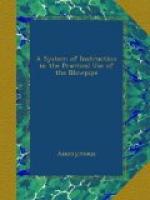(2) in open tube. Evolves water
and SO^{2}, which may be
recognized
by its odor.
(3) on charcoal. Loses water
and SO^{2}, and is converted into
[...Fe=].
(4) in forceps. Gives off
H and SO^{2}, and then behaves as the
magnetic
oxide.
(5) in borax. The roasted mineral affords an iron reaction.
(6) in mic. salt. As in borax.
(7) with carb. soda. Forms sulphide
of sodium and oxide of iron. The
former
is absorbed into the charcoal, and if cut
out
and laid upon silver and moistened gives the
S
reaction.
(8) Special reactions. If dissolved
in water, and a strip of
silver-foil
be introduced into the solution, the
metal
remains untarnished.
* * * * *
Mineral. Vivianite
Formula. [.Fe]^{3}[.....P] + 8[.H].
Behavior
(1) in glass-bulb. Gives off water.
(2) in open tube. —
(3) on charcoal. Froths up
and then fuses to a grey metallic
bead.
(4) in forceps. As on charcoal. Singes flame green ([.....P]).
(5) in borax. Gives the iron reaction.
(6) in mic. salt. As in borax.
(7) with carb. soda. In reducing
flame becomes magnetic and fuses to
a
black saggy mass.
(8) Special reactions. —
* * * * *
Mineral. Iriphyline
Formula. ([.Fe][.Mn][.Li])^{3}[.....P].
Behavior
(1) in glass-bulb. Gives off
water, having an alkaline reaction,
and
assumes a metallic lustre resembling
graphite.
(2) in open tube. —
(3) on charcoal. Fuses readily
to a black magnetic bead with a
metallic
lustre.
(4) in forceps. I. On platinum wire colors the flame crimson ([.Li]) and green ([.....P]), towards the point fuses to a black magnetic bead.
(5) in borax. Gives the iron and manganese reactions.
(6) in mic. salt. Gives the
iron reaction which overpowers that of
the
manganese.
(7) with carb. soda. Forms an infusible
porous mass, which under
the
reducing flame becomes magnetic.
(8) Special reactions. Gives the
manganese reaction with nitre and
carbonate
of soda on platinum foil.
* * * * *




